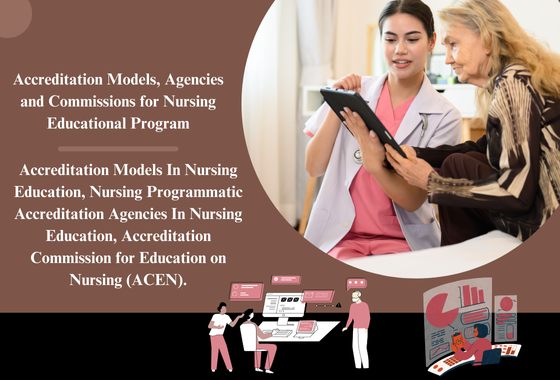The Accreditation Models Agencies and Commissions for Nursing Educational Program. This ensures a comprehensive education that optimally prepares students for the challenges of modern healthcare.
The Accreditation Models Agencies and Commissions for Nursing Educational Program
Agencies and Commissions for Nursing Accreditation Models in Nursing Education, Nursing Programmatic Accreditation Agencies in Nursing Education, Accreditation Commission for Education on Nursing (ACEN). Accredited institutions undergo rigorous evaluations to assess the quality of their curriculum, teaching methods, faculty qualifications, and clinical training.
Accreditation of nursing education ensures that programs meet quality standards and promotes a consistent standard for nursing education and service. Major accrediting bodies for nursing education include national agencies such as the Accreditation Commission for Education in Nursing (ACEN) and the National League for Nursing Accrediting Commission (NLNAC), national professional associations, and state agencies. Accreditation also facilitates the registration of nurses and assists schools/universities in maintaining quality and training competent professionals.
Accreditation Models in Nursing Education
The accreditation process model practiced by most accrediting agencies is a combination of a self-study and an on-site visit by a team of peer evaluators. The self-study is a document that provides a systematic and thorough examination of a program, and its components as related to its stated mission and expected outcomes.
The self-study provides evidence for program compliance with the standards and criteria of the accreditation agency. The self-study document is reviewed by peer evaluators including faculty members, administrators, and practitioners within the stated profession. An onsite visit is conducted by peer evaluators to verify, clarify, and amplify the content of the self-study.
The peer evaluators submit a report to the accreditation agency that addresses programmatic compliance with accreditation standards based on information obtained through the self-study and on-site visit. The decision-making body of the accreditation agency is composed of elected representatives who make the final decision to grant accreditation or reaccreditation, deny accreditation, or place the program on probation.
Accreditation agencies publish lists of accredited institutions and programs on their websites. The focus of the accreditation process is similar across accreditation organizations. The basic components addressed in institutional or programmatic accreditation include:
- Measurable program outcomes
- Curricula
- Faculty
- Qualified students
- Student support services
- Quality and adequate resources
- Qualified administration
- Policies and procedures
- Formal complaint mechanism
- Systematic program evaluation plan
Nursing Programmatic Accreditation Agencies in Nursing Education
At this writing, ACEN and CCNE serve as the two accrediting bodies for nursing programs in the United States. NLN CNEA, established in 2013, is in the process of seeking USDE recognition, and will serve as the third nursing program accreditation agency in the United States.
A summary of each agency and their standards, criteria, and processes are summarized in this section, but the reader is advised to review each agency’s web site for updated information.
Accreditation Commission for Education on Nursing (ACEN)
In 1997, the NLN approved the creation of the National League for Nursing Accreditation Commission (NLNAC) as an accrediting entity. In 2014 the NLNAC changed its name to the ACEN. The mission of ACEN is to support nursing education and practice as well as the public through accreditation.
ACEN defines accreditation as “a voluntary, self-regulatory process by which non-governmental associations recognize educational institutions or programs that have been found to meet or exceed standards and criteria for educational quality” (Accreditation Commission for Education in Nursing [ACEN], 2013).
ACEN provides accreditation for nursing programs ranging from practical, diploma, associate, baccalaureate, master’s, post-master’s certificate, to clinical doctorate programs.
ACEN serves as a Title IV gatekeeper for federal funds for those nursing programs that do not possess regional accreditation and is recognized by CHEA. ACEN is governed by a 15-member Board of Commissioners composed of individuals representing nursing education (nine commissioners), service (three commissioners), and the public sector (three commissioners).
The ACEN chief executive officer reports to the Board of Commissioners. ACEN operations are supported by professional, administrative, and support staff; program evaluators; and committees. ACEN program evaluators, or peer reviewers, participate as site visitors, evaluation review panel members, and appeal panel members.
Program evaluators must meet defined criteria related to their educational preparation, nursing education expertise, and professional service in addition to attending regularly scheduled program evaluator professional development sessions.
Expectations for program evaluators include maintaining confidentiality related to programs visited and recommendations made as a result of the self-study and on-site visit. ACEN site visit policies and procedures are published in the ACEN Accreditation Manual (Accreditation Commission for Education in Nursing, 2013).
Read More:
https://nurseseducator.com/didactic-and-dialectic-teaching-rationale-for-team-based-learning/
https://nurseseducator.com/high-fidelity-simulation-use-in-nursing-education/
First NCLEX Exam Center In Pakistan From Lahore (Mall of Lahore) to the Global Nursing
Categories of Journals: W, X, Y and Z Category Journal In Nursing Education
AI in Healthcare Content Creation: A Double-Edged Sword and Scary
Social Links:
https://www.facebook.com/nurseseducator/
https://www.instagram.com/nurseseducator/
https://www.pinterest.com/NursesEducator/
https://www.linkedin.com/in/nurseseducator/
https://www.researchgate.net/profile/Afza-Lal-Din
https://scholar.google.com/citations?hl=en&user=F0XY9vQAAAAJ
